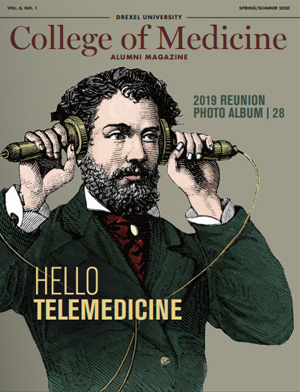Alumni Magazine - Spring/Summer 2020

Download Spring/Summer 2020 Issue [PDF]
View Spring/Summer 2020 eBook
Table of Contents
Did You Know?
Virtual Reality
Since the advent of COVID-19, the College of Medicine has embraced virtual reality. The General Faculty Meeting was held on schedule; the work of committees continues; classes are in session; and a virtual thesis defense was attended by 120 people. A bigger challenge is presented by celebratory events, but rather than cancel, faculty and staff rise to the occasion.
Virtual Match Day
Match Day is never ordinary for a graduating medical student, but on an ordinary Match Day — traditionally the third Friday in March — the seniors at medical schools around the country gather in a central place, are presented with envelopes they are not allowed to open, and maintain a jittery decorum as they wait for the clock to strike noon. Then they rip open their envelopes and find out their future.
This year, with the novel coronavirus on the horizon, Drexel College of Medicine students, staff and faculty responded by creating an extraordinary virtual Match Day. Even the jitters were represented as students awaited the signal to log in and view their results online. Then they celebrated each other with virtual hugs and high-fives. And the matches? They were amazing, as usual.
The Feeling Is the Same
Damarcus Ingram, who matched in internal medicine at Duke, says the change of venue didn’t lessen his excitement. “Even though the circumstances were different, I don’t think the feeling differed at all,” he says. “I’m really glad Drexel gave us the opportunity to do this with our peers, because they’re the people who know what we’ve been through.”
Silver Linings
Adrian Rainero Garcia and Meagan Clark matched together at Ohio State — he in emergency medicine and she in internal medicine. Rainero Garcia, who is from Spain, says his parents would not have been able to visit for an in-person Match Day. Thanks to the remote-only ceremony, his family was able to watch it in real time.
Necessity may be the mother of invention, but here we also credit TIME. The Technology in Medical Education group has been creating, developing, programming and facilitating since 2001 when, as MCP Hahnemann University, we became the first wireless medical school in the country. Watch the Match Day video at: https://bit.ly/DUCOMMatch2020.
Back to Top
Letters to the Editor
To the Editor,
When I received the Spring/Summer 2019 issue of the Alumni Magazine, the story “Take That Back” in the Short Report section caught my eye. There was a study in the International Journal of Radiation Oncology, Biology, and Physics: “Continued Citation of Retracted Radiation Oncology Literature — Do We Have a Problem?” (2019; 103 (5) 1036–1042).
This study is by Daniel George Hamilton at the Peter MacCallum Cancer Centre in Melbourne, Australia. He updated a list of known retracted articles, and used Google Scholar, Web of Science, and Scopus to determine the number of publications which cited the retracted articles. There were initially 47 retracted articles, and 34 articles received 407 English and 169 foreign-language citations after they had been retracted. Most occurred in the second year after the articles had been retracted. He concludes:
Postretraction citations are an avoidable phenomenon. The results of the study emphasize the need for investigators to adhere to good research practices to mitigate the influence and propagation of flawed and unethical research. Journal editors, peer reviewers, and the broader radiation oncology readership should remain diligent in ensuring that citations of retracted work are identified and removed before, during, and possibly even after publication.
I do not practice academic medicine, and have almost no research experience, but clearly this problem is widespread, and can potentially affect everyone who uses the medical literature. There was one example of a retracted study in a meta-analysis, which could potentially affect the conclusions of the meta-analysis and is concerning. Fortunately, more journal editors are becoming aware of it.
Peter Whitcopf, MD, MCP ’94
Do you have an idea for “Did You Know”? Please send it along! We also welcome letters to the editor. Please send your ideas or letters concerning the magazine by email to akh33@drexel.edu, or by mail to DUCoM Alumni Magazine, 1505 Race Street, Mail Stop 484, Philadelphia, PA 19102. Please include your contact information. Letters to the editor may be edited for space.
Back to Top